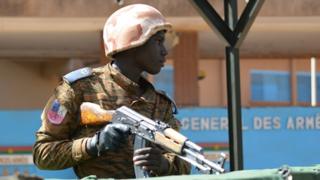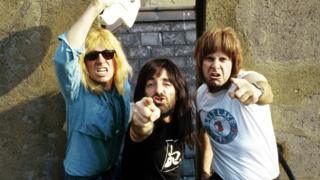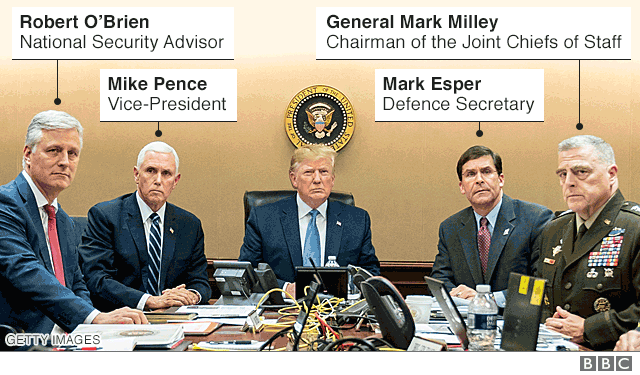
By all accounts, it should have been a triumphant moment for Donald Trump. The brutal leader of the Islamic State, Abur Bakr al-Baghdadi, was killed in a US raid in northern Syria – a climactic moment following the steady erosion of IS’s power in the region.
Instead, the episode became another pointed illustration of the perils of the president’s confrontational style of governing and the bitter partisanship into which the US has descended.
It began with Mr Trump’s Sunday morning announcement of the successful raid. His opening comments were pure Trump – celebrating the way al-Baghdadi died “like a dog” and marvelling at how he was able to see the operation unfold “as though you were watching a movie”.
It stood in contrast to Barack Obama’s solemn evening announcement of Osama Bin Laden’s death, although that should not be surprising at this point. Mr Trump has said that his conduct is “modern-day presidential” – and his blunt, frequently casual language is part of that package.
When pressed by reporters, however, Mr Trump’s attitude turned more incendiary. He criticised European allies, calling them a “tremendous disappointment” for not doing more to take possession of IS prisoners. He celebrated his immigration ban for select majority-Muslim nations as a way to protect the US from Islamic militants.
He also claimed that Baghdadi’s death was “the biggest” – bigger than the 2011 US raid that killed 9/11 mastermind Osama Bin Laden, which took place during the Obama presidency.
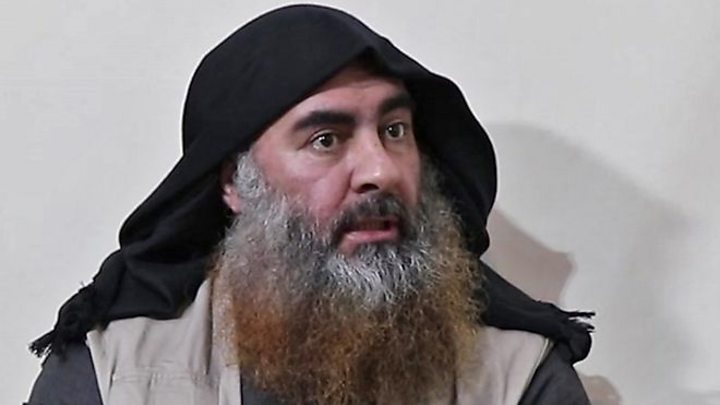
Media playback is unsupported on your device
Flouting tradition
Bin Laden was a recurrent theme in Mr Trump’s remarks. He said that in a book published in 2000 that he had pointed out that the Al-Qaeda leader “had to be killed before he knocked down the World Trade Center” but that “nobody” had heeded his warning.
“If they would have listened to me, a lot of things would have been different” the president lamented. (In fact, Bin Laden was a US target for years before 9/11, and Mr Trump never made such a statement in his book, The America We Deserve.)
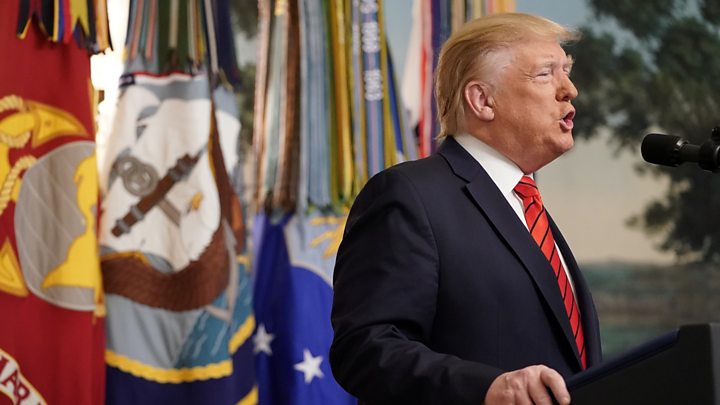
Media playback is unsupported on your device
The president also revealed that, in a break with tradition, Democratic leaders in Congress – including Speaker of the House Nancy Pelosi and House intelligence committee chair Adam Schiff – were not informed ahead of the raid.
“We were going to notify them last night, but we decided not to do that because Washington leaks like I’ve never seen before,” he said.
The president acknowledged that he had informed some Republicans in Congress, including Senate Intelligence chair Richard Burr and Senator Lindsey Graham, a frequent Trump supporter who had been critical of his recent Syrian policies.
Mr Trump also praised Russian and Turkish officials on Sunday, while acknowledging that he had given them advance warning of a US operation in the region – a move that did not go unnoticed by Democrats.
“The House must be briefed on this raid, which the Russians but not top congressional leadership were notified of in advance, and on the administration’s overall strategy in the region,” Ms Pelosi said in a press statement. “Our military and allies deserve strong, smart and strategic leadership from Washington.”
The following day, on his way to a speech and fundraiser in Chicago, Mr Trump elaborated on his decision to exclude the current House intelligence chair – who also happens to be leading the impeachment investigation into the president.
“I’ve watched Adam Schiff leak,” Mr Trump said. “He’s a corrupt politician. He’s a leaker like nobody’s ever seen before.”
Political mileage?
Prior to launching the Bin Laden raid, Barack Obama informed leaders of both parties in Congress. Some, such as the Republican then chairing the House Intelligence Committee, said they had been in touch with the White House regarding its Bin Laden efforts for months.
The Bin Laden raid has, in fact, sparked numerous charges of Washington hypocrisy since Sunday morning.
Byron York, a conservative writer for the Washington Examiner, noted on Twitter the marked difference between Ms Pelosi’s response to the strikes on Bin Laden and Baghdadi. In the former, she “saluted” Mr Obama, while she reserved such praise only for “military and intelligence professionals” in her statement about the latter.
Meanwhile, the Washington Post published an entire article detailing the many times Mr Trump attempted to deflect credit away from Mr Obama for Bin Laden’s death.
It is difficult to gauge at this point what, if any, political benefit Mr Trump will reap from al-Baghdadi’s death. Mr Obama saw only a temporary bump in his approval ratings following the Bin Laden strike, although his campaign touted the accomplishment repeatedly during his 2012 re-election campaign.
Despite Mr Trump’s insistence, Baghdadi is hardly the US household name that Bin Laden was. The president has, however, had been the subject of sharp bipartisan criticism in the weeks since his sudden withdrawal of US troops from northern Syria presaged a Turkish military operation against US-allied Kurds in the area.
While Democrats remain unmoved, dispatching the IS leader could assuage some Republican concerns about the president’s Syria policy.
“What I see happening in Syria, makes sense to me,” Senator Graham said in a White House conference after the Baghdadi announcement. “Now I understand what the president wants to do. He wants to reduce our footprint and lower our costs. And he is right to want to do that.”
It could turn out that the raid bolsters Republican support, infuriates Democrats and leaves the US public sharply divided. In other words, more of the same in the Trump presidency.











